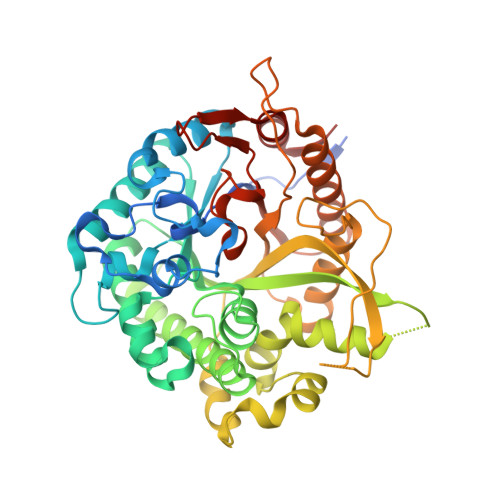Glycosidase Inhibition: An Assessment of the Binding of 18 Putative Transition-State Mimics.
Gloster, T.M., Meloncelli, P., Stick, R.V., Zechel, D., Vasella, A., Davies, G.J.(2007) J Am Chem Soc 129: 2345
- PubMed: 17279749
- DOI: https://doi.org/10.1021/ja066961g
- Primary Citation of Related Structures:
2J75, 2J77, 2J78, 2J79, 2J7B, 2J7C, 2J7D, 2J7E, 2J7F, 2J7G, 2J7H - PubMed Abstract:
The inhibition of glycoside hydrolases, through transition-state mimicry, is important both as a probe of enzyme mechanism and in the continuing quest for new drugs, notably in the treatment of cancer, HIV, influenza, and diabetes. The high affinity with which these enzymes are known to bind the transition state provides a framework upon which to design potent inhibitors. Recent work [for example, Bülow, A. et al. J. Am. Chem. Soc. 2000, 122, 8567-8568; Zechel, D. L. et al. J. Am. Chem. Soc. 2003, 125, 14313-14323] has revealed quite confusing and counter-intuitive patterns of inhibition for a number of glycosidase inhibitors. Here we describe a synergistic approach for analysis of inhibitors with a single enzyme 'model system', the Thermotoga maritima family 1 beta-glucosidase, TmGH1. The pH dependence of enzyme activity and inhibition has been determined, structures of inhibitor complexes have been solved by X-ray crystallography, with data up to 1.65 A resolution, and isothermal titration calorimetry was used to establish the thermodynamic signature. This has allowed the characterization of 18 compounds, all putative transition-state mimics, in order to build an 'inhibition profile' that provides an insight into what governs binding. In contrast to our preconceptions, there is little correlation of inhibitor chemistry with the calorimetric dissection of thermodynamics. The ensemble of inhibitors shows strong enthalpy-entropy compensation, and the random distribution of similar inhibitors across the plot of DeltaH degrees a vs TDeltaS degrees a likely reflects the enormous contribution of solvation and desolvation effects on ligand binding.
Organizational Affiliation:
York Structural Biology Laboratory, Department of Chemistry, University of York, York YO10 5YW, UK.

















